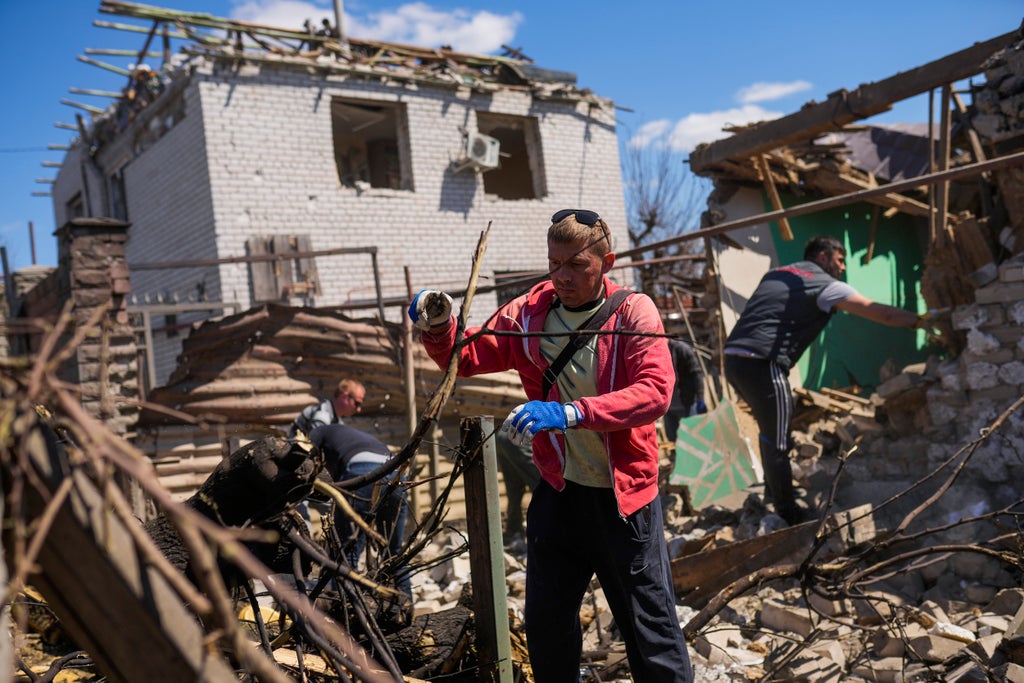
The boy was at home when the rocket struck across the street and the window shattered. Stunned, he found his father and crawled under his blanket. They clung to each other and asked, “Are you still alive?”
Then the father noticed blood. Glass shards had cut the boy’s right leg to the bone.
The 11-year-old Ukrainian boy was one of at least three people wounded Thursday morning in what emergency officials called the first strike in a residential area of the southern city of Zaporizhzhia since Russia’s invasion began. The city has been a crucial waypoint for tens of thousands of people fleeing the besieged southern port of Mariupol and is home to Europe's largest nuclear plant.
The rocket strike came as parts of southern Ukraine are preparing for a further onslaught by Russian forces who seek to strip the country of its Black Sea and Sea of Azov coasts.
Residents said at least eight homes in the modest neighborhood of cherry trees and wooden fences were damaged or destroyed.
The rocket had been hit by Ukraine’s anti-aircraft system, emergency services official Pavlo Zhukov told The Associated Press at the scene, adding that a direct hit on the neighborhood would have been far worse.
The boy’s father, Vadym Vodostoyev, stood in the courtyard and held up his still-shaking hands.
“There’s no military here, no strategic facilities,” he said. “We were no threat to them.”
He thought of his son and came close to tears.
“It just takes one second and you’re left with nothing,” he said.
Ukrainians have been living with that fear for two months now.
The rocket stripped the ordinary from a sunny morning. It bent a metal garage door inward, rippled ceilings and cracked walls. It killed a neighbor’s dog.
Katerina Klimasheva, 68, was standing in her kitchen making coffee. The shock wave from the rocket slammed the door of her cupboard into her. It left glass shards embedded in the chest of one of her sons.
She opened the refrigerator, which was pierced by shrapnel, and smashed egg yolks dribbled out.
“Fascists,” she said of the Russian leadership in Moscow. “I’m Russian. We’re Russian. But I’ve lived here all my life. I’ve not seen such people. And then they say attacks like these are false.”
Klimasheva said she assumed the rocket had been meant for the railway nearby or for the local steel plant. Russia has been targeting Ukraine’s infrastructure for weeks, smashing factories, fuel depots, bridges and highways in a destructive fury that will take billions to rebuild.
Another of her sons, Anatoly Kongurtsev, waved a hammer through the broken kitchen window in anger.
“Attacking children? What can I say?” he said. “They’re swine.”
Across the street, steps from the rocket’s crater, Artem Lazarenko was thankful he had woken up when he did and wandered into a back room of his now-destroyed house. Dried blood crusted in his left ear where his eardrum had burst.
“Nobody knows what’s inside their heads,” he said of the Russians. “Nobody wants to fight, but I will if I have to.”
The 26-year-old construction worker was already planning to rebuild. But the crushed yellow Lada parked next to the house was a total loss.
“It was broken anyway,” Lazarenko said. “But not like this.”







